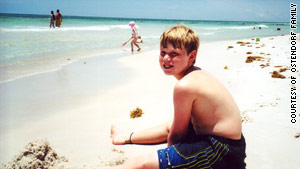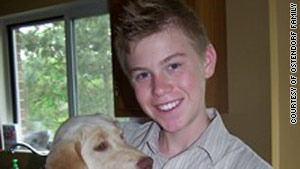WASHINGTON — A president who has said he benefited from the civil rights movement added to it Wednesday by giving gay men and lesbians the right to fight for their country without hiding their sexual orientation.
Describing it as "a moment more than two centuries in the making," President Obama signed into law a repeal of the 17-year-old "don't ask, don't tell" policy that required servicemembers who are gay to keep it a secret. When fully implemented in a matter of months, he said, the action will make the nation's armed forces stronger.
"There will never be a full accounting of the heroism demonstrated by gay Americans in service to this country. Their service has been obscured in history," the nation's first African-American president said. "But at every turn, every crossroads in our past, we know gay Americans fought just as hard, gave just as much to protect this nation and the ideals for which it stands."
It was a poignant culmination of a battle Obama launched during his presidential campaign but has struggled to win amid the harsh realities of governing. Describing himself as "overwhelmed," the customarily reserved president elated hundreds of gay rights activists who have been disappointed at times by his mixed record on their behalf. Obama signs historic bill
Rep. Barney Frank, D-Mass., the nation's most prominent gay lawmaker, called it the biggest piece of civil rights legislation since the Voting Rights Act of 1965. Yet Frank, like others in the audience, said it marked only a step toward full equality that one day should include the right to marry. "We're at the halfway point," he said.
At a news conference later to mark the end of his second year in office, Obama equivocated on the subject of gay marriage — something he has opposed in the past while favoring civil unions, which would give gays and lesbians new legal rights.
"My feelings about this are constantly evolving," Obama said. "I struggle with this."
The boisterous crowd that heralded the bill signing cheered as a history they helped to create was made. They savored the moment with standing ovations and cries of "Yes We Can" and "U-S-A."
"It's history, and very few people get to experience history in a way that they benefit from," said Dan Choi, an Iraq war veteran and former Army first lieutenant who came out on television last year and was discharged as a result in June. "When you fight for something you believe in, sometimes you have to break the rules."
President Clinton agreed to the "don't ask, don't tell" policy in 1993 as a compromise to replace a Pentagon policy that homosexuality was incompatible with military service. More than 17,000 gay men and lesbians were discharged under the initial policy, as well as 14,000 more since 1993.
The fight to repeal the law was uphill even after Obama won the White House. It took until last weekend for the Senate, in a "lame duck" session, to vote 65-31 for repeal; opponents such as Sen. John McCain, R-Ariz., warned it could weaken military readiness. Republicans' gains at the polls last month likely would have made repeal more difficult next year.
"It's a great day in America," said Darrel Choat, a Marine Corps major who attended the bill-signing ceremony. "It would have been way worse for the next couple of years."
Choat came to shake hands with the president, for whom he had worked as a White House social aide. When the two met in the front of the Interior Department auditorium after the event, Choat said Obama told him: "See, I told you we'd get it done."
It's not quite done. The law gives the Pentagon time to implement the policy, which Obama has said could take months. He said he spoke to his service commanders Tuesday — including Gen. James Amos, commandant of the Marine Corps, who previously opposed the repeal.
"I have spoken to every one of the service chiefs, and they are all committed to implementing this change swiftly and efficiently," Obama said. "We are not going to be dragging our feet to get this done."
In the meantime, gay rights advocates are warning active-duty personnel against declaring their sexual orientation too soon. "The sooner the law is implemented, the sooner our gay and lesbian servicemembers can begin serving their country with honesty and dignity," said Laura Murphy of the American Civil Liberties Union.
The president was joined on stage by some of the gay and lesbian heroes of the repeal effort: Marine Staff Sgt. Eric Alva, who lost a leg as the first American wounded in Iraq, and retired Navy commander Zoe Dunning, who served openly as a lesbian after more than two years of legal battles in the 1990s.
The loudest ovation of the day was reserved for Adm. Michael Mullen, chairman of the Joint Chiefs of Staff. Obama quoted Mullen as having said, "Our people sacrifice a lot for their country, including their lives. None of them should have to sacrifice their integrity as well."
Speaking directly to gays and lesbians at the end of his remarks, Obama urged them to serve with honor, and he welcomed new recruits:
"I say to all Americans, gay or straight, who want nothing more than to defend this country in uniform: Your country needs you, your country wants you, and we will be honored to welcome you into the ranks of the finest military the world has ever known."


